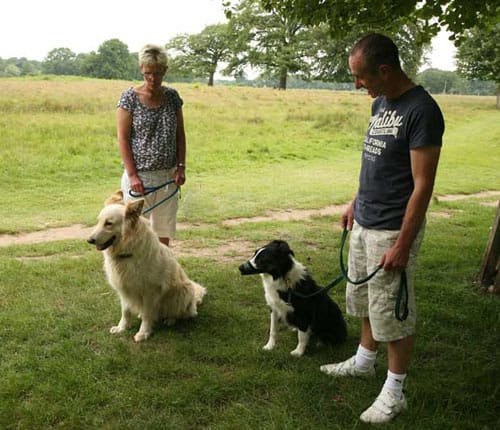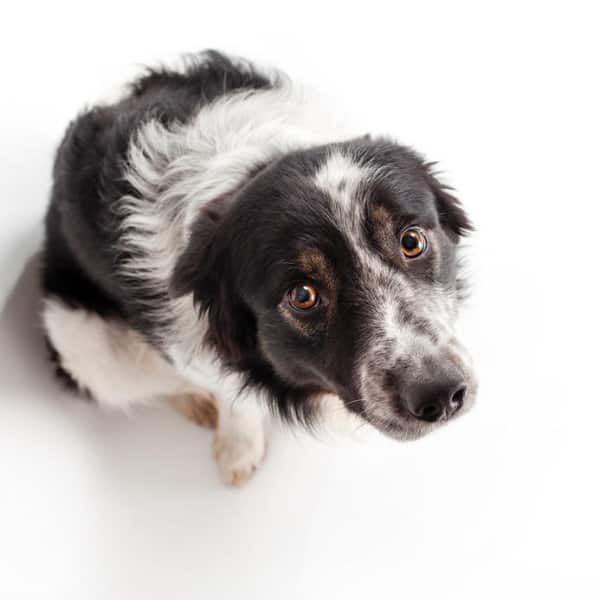Can Dogs Be Autistic
Can Dogs Have Autism?
What is autism? Autism is a lifelong developmental disability that affects how people perceive the world and interact with others. Autistic people see, hear and feel the world differently to other people. If you are autistic, you are autistic for life; autism is not an illness or disease and currently cannot be ‘cured’ The other important fact to understand is that autism is congenital, meaning that dogs or humans cannot suddenly become autistic, they are born with autism.

Does Autism Occur in Dogs?
Is it possible for a dog to be autistic? Suffer from ADHD or Asperger’s?
Are these apparent behaviours congenital in other words genetic, or created by other influences after the individual is born?
This article will hopefully answer all these questions and give you some idea of what autism looks like in dogs.
It never occurred to me that autism could affect dogs as well as humans until I met a Doberman almost 18 years ago.
I would not have contemplated what I was seeing as autistic behaviour, if I hadn’t had an interest in human psychology, including ASD (Autistic Spectrum Disorder)
Without this interest, I probably would have considered the behaviour to be related to a lack of early socialisation by the owner, or a lack of early handling by the breeder.
Yet the owners had assured me they had chosen the puppy carefully. They had carefully chosen a brilliant breeder, it had also attended puppy and socialisation classes from an early age.
This dog had a number of behavioural problems. One was a fear of anything new, It did not learn from good experiences. For instance, it barked at the owners every time they came downstairs, entered a room or went to the door.
Passing bins or anything flapping or moving, including leaves, tissues and plastic bags were seen as creatures from the black lagoon and therefore terrifying objects to be feared and barked at. I took it for a walk and it was startled by most things on that walk including bikes, cars, people, dustbins, signs and other dogs.
It wasn’t aggressive other than barking, just very fearful of almost any situation, despite being introduced many times before to those situations and stimuli. In some dogs aggression is also one of the manifestations of autism. As it is with people that have ASD
We have to be careful we do not mix up (1) Fear and Timidity in Dogs with autism. Most cases of fearful dogs are either genetic or the most common reason is lack of (2) Early Socialisation the other main reason for most fear-based dogs and aggression is (3) Neutering.
We also must not mistake many OCD Obsessive-Compulsive Disorders as a sign that your dog could be suffering from autism. Read my article (4) Obsessive Compulsive Disorders in Dogs. Having said that there is the case of EBTs English Bull Terriers and tail-chasing that is believed to be a form of autistic behaviour. see a link to (9) Dogs and Autistic Behaviour
After this Doberman client, I was more attentive to this type of behaviour, and noticed that many people were telling me they called their dog or puppy “my special needs baby”
I can state that of the many thousands of behaviourally challenged dogs I have worked with over the years, only a very small percentage showed what can only be described as ASD. It is certainly not as common as it is in humans.
I have treated many dogs with forms of ADHD, I find quite often in these cases that food or early neutering is at the root of this problem, but not always.
We know dogs can have dementia, OCD, schizophrenia, Alzheimer’s and many fear and hormone-based behaviours. They get almost all the illnesses that we get, so why not Autism?
In a way dogs are all very mildly autistic, they live for the now and see things in pictures. Animals think and see things in a visual spectrum, their memories are stored like a picture album they assimilate everything through this visual association.
Fear, causing anxiety and stress is the main emotion of autism, and is the most important emotion that animals have, especially prey animals like sheep and most grazing animals;
Autistic children can have a stronger attachment to pets than those without ASD. Pets especially dogs are often bought to be companions to children and adults who have ASD. (5) Temple Grandin is an assistant professor of animal science at Colorado State University and also has autism. She is the author of the book Thinking in Pictures. Her insights on how animals think will change your whole thinking of how dogs and pets learn.

Socialisation:
The picture on the right is with the dog’s owners it was one of the most difficult cases of autism I have ever dealt with.
This young collie had been to another well-known behaviourist at 5 months, who had recommended the puppy be euthanised.
It literally could not cope with anything, from people dogs or just anything that moved, fluttered, or flapped. When I first met him he spun round in a circle defecating and urinating just spinning like a top, not tail-chasing it was extremely odd.
He was terrified of everything. This is him with one of my assistance dogs Kai a white German Shepherd. He worked with me in my practice along with four other of my dogs that helped in my practice with dogs that were difficult, aggressive or fearful.
Though he had a soft mesh muzzle on for my dog’s safety, this dog did not try to attack Kai and ended up playing with him. Though Kai who was 8 years old at the time is no longer with us, as this was taken in 2010 I hope the Collie is still with his owners.
If they read this article I hope they get in touch again. Though he could not be cured, his actions could be controlled and he ended up much calmer and the owners were happy to keep him and work through his problems.
Like humans, dogs go through a number of critical periods during their formative weeks and months. If they do not get critical early learning, stimulation and socialisation, then their behaviour in later life will probably be affected. I am not referring to dogs with autism when I say this. These are dogs who have lacked socialisation and interaction with the breeder, the new owner or both,
The first 16 weeks of a dog’s life is critical to the psychological and behavioural outcome of that puppy. Read critical periods (6) Part One and (7) Part Two.
Autism is quite rare in dogs, as stated earlier. I see perhaps 5 or 6 a year that show classic symptoms of ASD. Some scientists and many Vets even doubt that the condition exists.

Causes of Autism in Dogs and Humans:
We still really do not understand what the triggers are for Autism in humans. Therefore, in dogs, it is even less understood. There are two main suggestions on why autism is occurring.
(1) Some scientists who have studied autism believe that it is caused by underdevelopment in certain brain circuits and the over-development of other sensory circuits.
(2) It has also been suggested that it could be a condition inherited from parents or forebears. Autism is congenital, meaning that dogs or humans cannot suddenly become autistic, they are born with autism.
Pregnancy scans apparently show that foetuses in the womb show abnormalities that can turn out to be forms of autism Other studies have associated the occurrence of autism in dogs and humans with parents that were exposed to different toxins.
It has been suggested that Autism in humans could be related to cluster vaccines like MMR (Mumps Measles and Rubella) processed food or food that had been sprayed with various chemicals such as pesticides.
Therefore, these toxins could be one of the triggers for the enormous increase in ASD cases over the last 50 years. Dogs do not get the MMR vaccines but they do get cluster vaccines, which are a number of vaccines for various diseases all at the same time. Such as Distemper, Parvovirus, Hepatitis and Parvo.
Researchers have also been working for some time on a theory that dog and human autism is related to a lack of malfunctioning or absent mirror neurons in the brain. This is certainly a plausible area of research and is worth considering (8) Broken Mirror Neurons and Autism
Neurtologicalcientists have suspected that the root of autism spectrum disorders occurs in specialised brain cells called mirror neurons, A mirror neuron is a neuron that fires both when an animal acts and when the animal observes the same action performed by another. Thus, the neuron “mirrors” the behaviour of the other, as though the observer were itself acting.
There is data that appears to back this assertion (12) Information and Research Mirror Neurons. These mirror neurons are involved in the recognition of emotions in other people, empathy and mimicking behaviours. Accordingly, dysfunction in these neural circuits would explain some of the symptoms associated with autism spectrum disorders.
It has now been discovered that dogs have mirror neurons too. As in humans, these mirror neurons play an important role in the bonding process and other social behaviours. It is, therefore, entirely logical that dogs suffering from autism-like conditions have problems with their mirror neurons, but this has yet to be established conclusively.
That begs the question, what causes the malfunctioning neuron? Unfortunately, we do not any firm scientific evidence that could point to the trigger other than the previous suggestions and theories.
Even though there are no official studies on this condition, some scientists that have been studying the mirroring neurons in dogs’ brains concluded that the dogs that presented the symptoms lacked those neurons and decided that those missing neurons are precisely the cause of the autism in dogs.
As this would be a neuronal difference, the dogs can’t “get sick with autism.” The dog would have to be born with this condition, inherited from a relative, to present these symptoms.
Symptoms of Canine Autism:
It can be hard to tell if your dog is autistic, it is still being debated on whether or not ASD (Autistic Spectrum Disorders) even technically exists in dog behaviour. Vets
Secondly, very little is understood on the full cause and effect of how autism manifests itself in dogs. Last but not least, dogs with autism may not always display similar symptoms or their symptoms could be so subtle that they may not be recognised at all. Certainly, the veterinary profession is disdainful of anyone suggesting that dogs could be on the autistic spectrum. Their governing body has recently put out an article to say that ASD is not a recognised problem in dogs. My personal belief is they are wrong and that autism does exist in our pets.
Dogs With Autism May Show Some or All of The Following Symptoms:
- Apathy. Lack of feeling or emotion, with low activity levels or excitement
- A fear of anything new and in some cases the inability to accept something is not frightening or threatening despite seeing it many times
- Routine and Repetitive Behaviour. Pacing, shadow or tail-chasing Anxiety when taken out of daily routine and fear when in a new environment.
- Flawed interaction with other dogs, people or the owner, whereby their anxiety levels spike when put into a new situation.
- Avoidance Behaviour. Restricting themselves to just a small number of actions and shun new actions or unfamiliar games
- Lack of activity. This is especially noticeable in breeds that are high-energy dog as the lack of activity can be quite surprising.
- Organisational. Dog owners have noticed their pets putting toys or other objects in one place or in order of colour or shape.
- Reactional Stimulus. This is reacting against either visual or sound in either a fearful or aggressive way even if they had seen or heard these stimuli before.
- Fixated. May become fixated on an object or activity with abnormal intensity or focus.
- Singular or Strange Food Preferences. May have odd food preferences, such as eating only a few foods or eating only foods with a certain texture.

Autistic Behaviour Research:
Just as the incidence of Autistic Spectrum Disorders has risen alarmingly in children over the last 50 years. There is evidence that similar behavioural disorders have been observed in pets, most widely reported is of course dogs.
Though it may have been reported far earlier, the first actual peer-reviewed research to specifically suggest autism in dogs was Dr Nicholas Dodman, in 2011.
Dr Dodman a veterinary behaviourist found a correlation between English Bull Terriers and autistic behaviour.
Once again worth a read though I am not totally convinced, though it has some sound arguments (9) Dogs and Autistic Behaviour
Helping Dogs With Autism:
If you suspect that your dog may be autistic you should try and understand that this type of dog not only requires but actually craves routine in its life, anything outside of these daily routines can create fear and anxiety.
Gradually and carefully desensitize your dog to things it is impossible to avoid on a day to day basis. Early socialisation is a must, especially in the first 16 weeks of a puppies life.
Even shifting furniture or moving the dog’s bed can create an anxiety episode that will unsettle the dog. Changes in owner or houses will be particularly hard on dogs that are routine driven.
There is currently no known cure for autism. All you can do is give lots of affection, attention and praise when he accepts any new environment. Sometimes mild anti-anxiety herbal medication can help such as (10) Skullcap and Valerian Tablets I sell these in my store
We started seeing in the mid-1960s an alarming rise in autism in children. That is about 52 years ago. I think it is time we put a lot more effort and money into finding out the true cause of this life-changing disability.
I am not a person that believes in conspiracy theories I prefer science and facts. However, science is not always right, just look at the research done on wolves and see the reality when we observed them in their natural habitat. Read my Article (11) The Alpha Myth
I believe that the reality of what has caused the explosion in autism in humans and to lesser extent dogs is either known or suspected but is either being withheld because of either blame, power or money is involved.
For instance, it could be a recommendation by successive governments around the world to follow a required program such as additives put in drinking water or chemicals in the food chain or required vaccinations.
I would certainly take a long hard look at the food, drug and vaccine corporations as a starter for 10. I truly believe it is some form of toxins that have caused this virtual pandemic to happen.
©Stan Rawlinson March 2018
Updated August 2021
4) Obsessive Compulsive Disorders in Dogs
(5) Temple Grandin
(8) Broken Mirror Neurons and Autism
(9) Dogs and Autistic Behaviour
(10) Skullcap and Valerian Tablets
(11) The Alpha Myth
Leave a Reply Cancel reply
You must be logged in to post a comment.














Comments (2)
Autism & ADHD
Hi,
A very interesting article, particularly the fact that autism rose significantly in the mid 1960’s. Were you aware that the use of plastic for food packaging received original approval in the 1960s by the FDA under its food additive regulations. Could there be some correlation between the harmful effects of the oestrogen mimicking chemicals that leach from plastic containers (particularly when heated) into our food and drink?
Clare
Autism & ADHD
I believe it will come out in the future that this tsunami of Autism & ADHD was created by toxins. It could be Chemicals, Plastic, Vaccines, GM Crops, or Pesticides or something else but certainly, it is related to a man-made source.